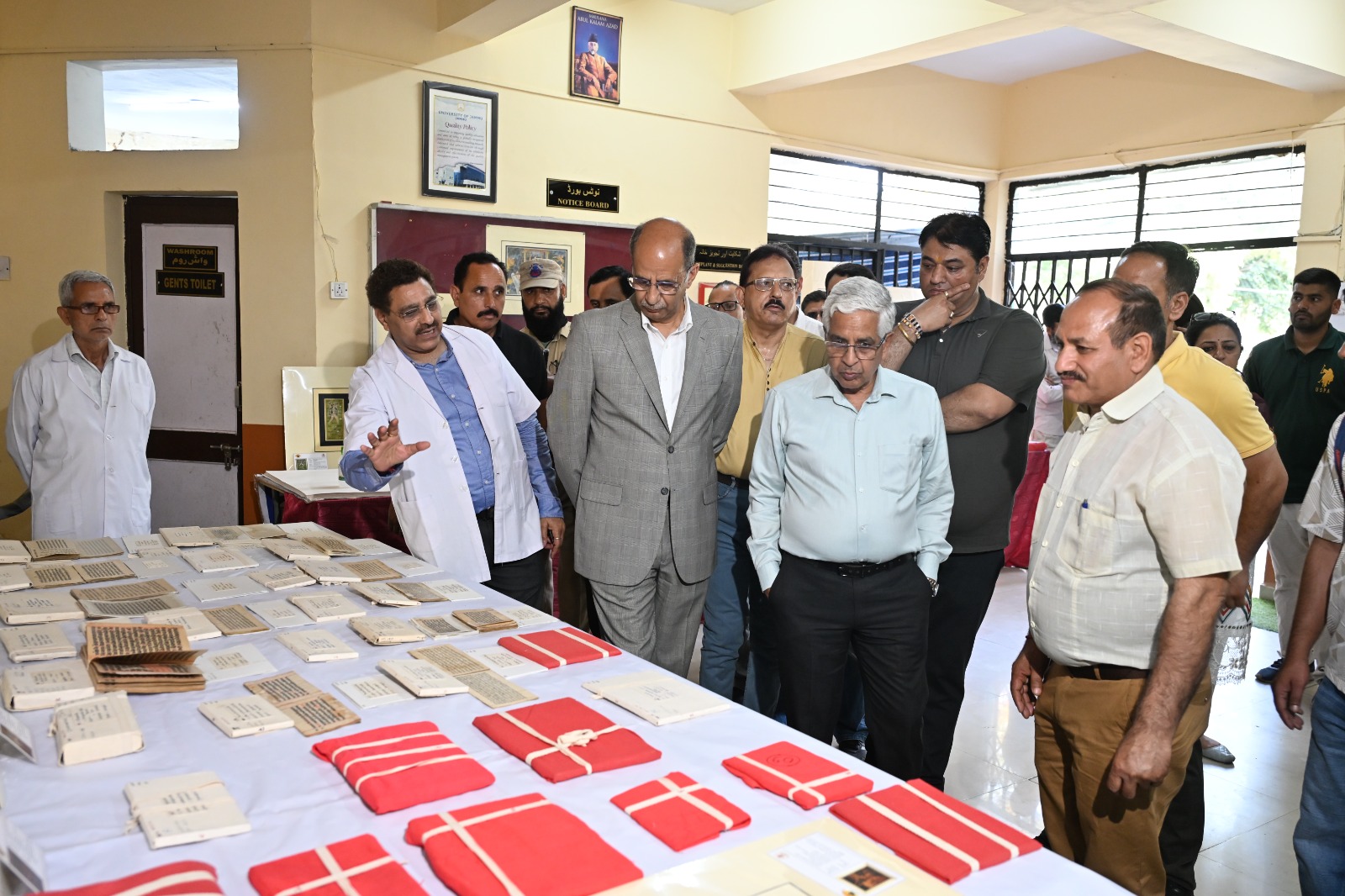About University

Cradled in the lap of mountains at the foothills of auspicious Trikuta, besides the river Tawi at an altitude of 1030 ft. is Jammu. This 'city of temples' has many places...
JU organizes one-day Manuscript Exhibition cum Workshop

Jammu April 17: The Department of Urdu, University of Jammu and the Manuscript Conservation Centre, Shashvat Art Gallary and Museum, Jammu regional and Research Centre of National Mission for Manuscript, Ministry of Culture, Government of India, New Delhi jointly celebrated “World Heritage Day ” today on the theme "Conservation of Manuscripts." The event featured exhibition and one-day workshop led by expert conservators from the Manuscript Conservation Centre, operating under National Mission for Manuscripts, the Ministry of Culture, Government of India, New Delhi.
The event included the exhibition-cum-workshop which was inaugurated by Jb Nasar Aslam Wani, Advisor to Hon’ble Chief Minister of Union Territory of Jammu and Kashmir while Prof. Umesh Rai, Vice Chancellor, University of Jammu presided over the function. The presidium was also shared by Prof. Shohab Inayat Malik, Head, Department of Urdu, University of Jammu and Dr. Suresh Abrol, Coordinator of the Manuscript Conservation Centre under, National Mission for Manuscripts, Regional and Research Centre Jammu, Ministry of Culture.
Speaking at the event, Chief Guest Jb. Nasir Aslam Wani emphasized the pivotal role of the National Education Policy (NEP) 2020 in redefining the educational landscape by placing language, culture, and the arts at the core of learning. Commending the Department of Urdu for its efforts, he urged students and scholars to recognize the immense value of Indian languages like Urdu, Hindi, Punjabi, and Sanskrit. “These are not just mediums of communication—they are carriers of our history, our emotions, and our identity,” he said. Stressing the importance of linguistic pride, he added, “One should never be apologetic about speaking their mother tongue. Language is a source of dignity, not division.”
The Chief Guest also laid strong emphasis on the preservation of manuscripts, describing them as the “living soul of our heritage.” He pointed out that these ancient texts encapsulate centuries of wisdom, philosophy, literature, and cultural memory, and their conservation is vital to understanding who we are as a civilization. “Preserving manuscripts is not just an academic exercise—it is an emotional and cultural responsibility. They are a testimony to our pluralistic past and must be safeguarded with urgency and care,” he asserted. He called for greater institutional support and public awareness to ensure that this legacy is passed on to future generations with pride and purpose.
Presiding over the event, Prof. Umesh Rai, Vice Chancellor, University of Jammu, delivered an insightful address that called for a fundamental reimagining of how language education is approached in the modern era. Expressing concern over the declining interest in traditional languages like Urdu, Dogri, and Punjabi, Prof. Rai urged academic departments to think beyond the conventional blackboard model and focus on making languages relevant, practical, and employment-oriented. “We must ask ourselves—how many teachers or researchers can we realistically produce in these fields? Where will our students go if we do not link language studies with opportunities for meaningful careers?” he said.
In a thought-provoking remark, Prof. Rai questioned whether artificial intelligence could be leveraged to restore incomplete manuscripts. “Can we create software, particularly in Urdu, that could help recover missing portions of historical texts? Can AI assist us in manuscript reconstruction and preservation?” he asked. Encouraging interdisciplinary innovation, he urged language departments to explore such possibilities in collaboration with IT and heritage studies. He further reiterated the University's commitment to digitizing manuscripts and extending support for their preservation. “This is not merely an exhibition; it’s a mission. Unless we adopt a mission-oriented approach, the true impact of such initiatives will remain unrealized,” he affirmed.
Highlighting the broader context of heritage conservation, Prof. Rai connected the preservation of manuscripts to the larger ecosystem of cultural heritage, which includes language, literature, arts, and indigenous knowledge systems. “Our heritage is a mirror to our identity and evolution as a society. It holds immense potential in fostering social cohesion, economic empowerment, and environmental sustainability,” he said. Concluding his address, the Vice Chancellor called for embracing the four Cs—Culture, Creativity, Commerce, and Collaboration—as guiding pillars in safeguarding India's rich and diverse cultural legacy. He congratulated the Department of Urdu and the associated departments for their commendable efforts in organizing the manuscript exhibition, held in observance of World Heritage Day.
Dr. Suresh Abrol emphasized the significance of manuscript conservation. The resource persons, including Coordinator Dr. Suresh Abrol, Senior Conservator Kailash Kumar and Junior Conservator Kewal Krishan Kotwal and Romesh Chander Advisor of the above said Museum conducted training sessions on the fundamentals of manuscript conservation.
Earlier, Prof. Shohab Inayat Malik provided insights into the Centre's initiatives and rationale behind selecting the workshop theme, aligning with the International Council of Museums' (ICOM) overarching theme for World Heritage Day 2025, "Museums for Education and Research."
Participants, comprising students, scholars, and faculty members from colleges across Jammu and Kashmir, engaged as trainees in the program. The program was designed to encompass a wide array of activities, ranging from exhibiting a diverse collection of manuscripts to providing hands-on experience and imparting comprehensive knowledge on the principles and techniques of manuscript conservation.
Dr. Abdul Rashid Manhas, Assistant Professor at the Department of Urdu conducted the proceeding of the program while vote of thanks was presented by Dr. Chaman Lal, Assistant Professor at the Department of Urdu. A large number of students, scholars, college and University faculty members including Aseer Kishtwari, Khalid Hussain, Sohil Kazmi and Dr Shehnawaz Parveen.